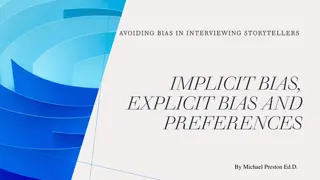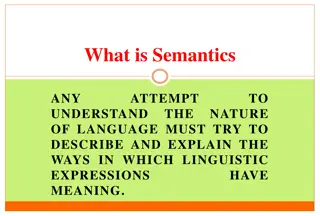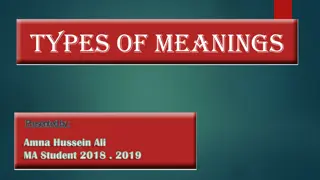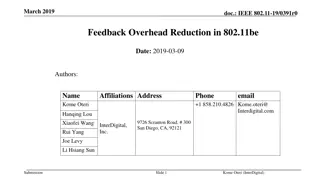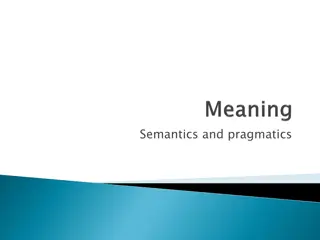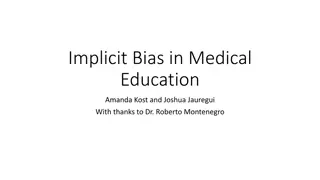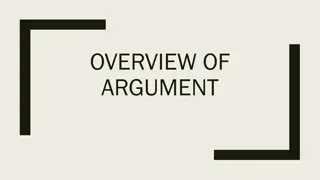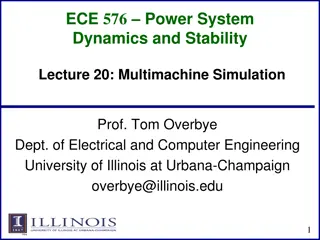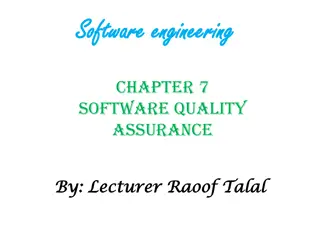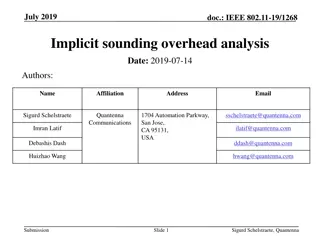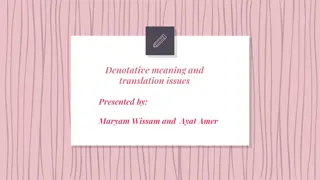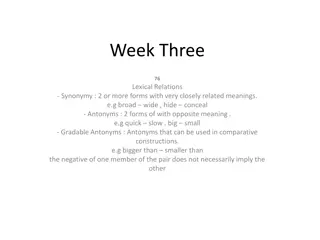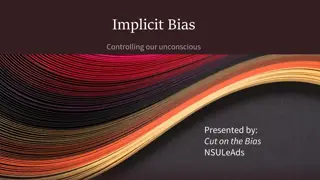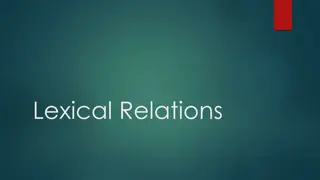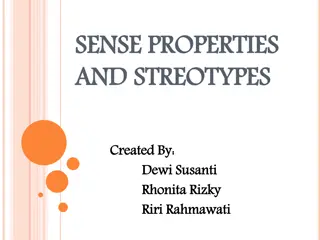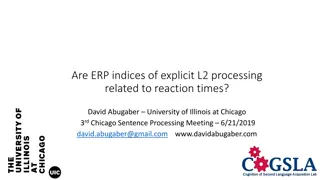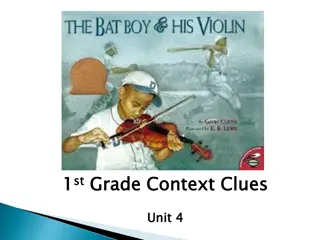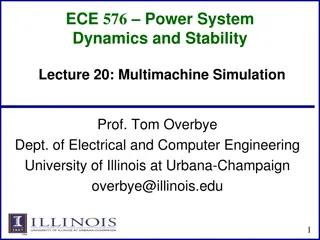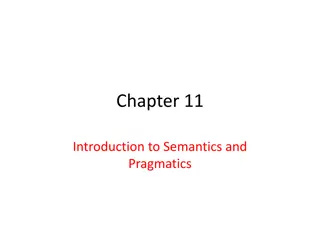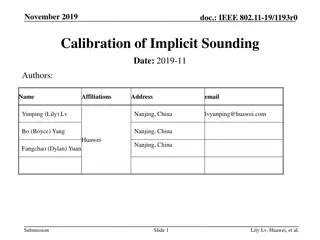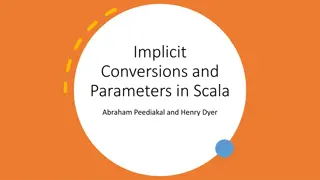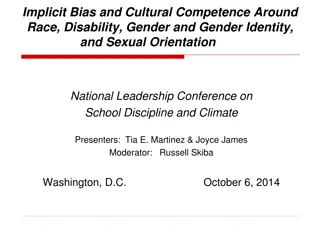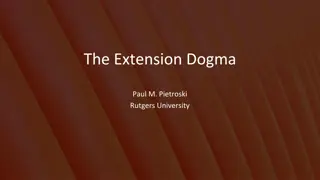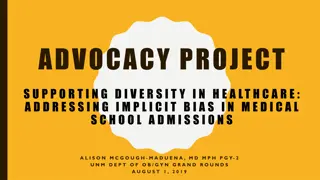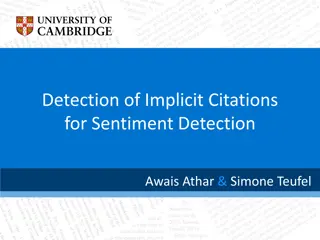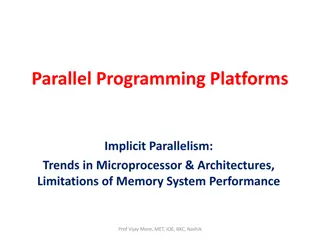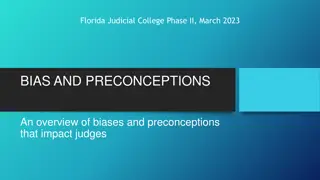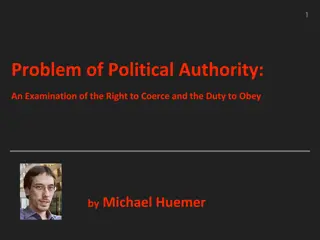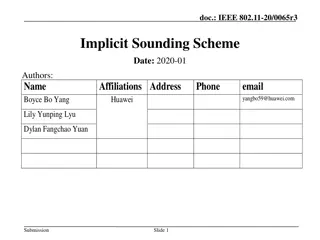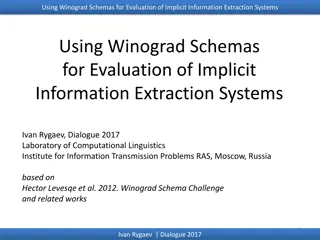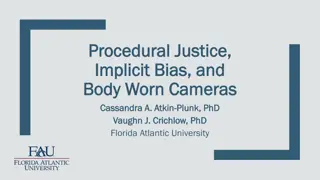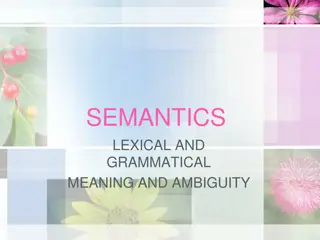Implicit Bias in Dance: Exploring Unconscious Beliefs and Behaviors
Explore implicit bias in the context of dance research through the lens of unconscious beliefs affecting judgments, behaviors, and social interactions. The discussion delves into the impact of implicit cognition on various aspects like self-esteem, social judgment, decision-making, and prejudice, hi
0 views • 16 slides
Understanding and Overcoming Bias in Interviewing
Bias in interviewing can arise from implicit and explicit prejudices, impacting perceptions and interactions with interviewees. Implicit biases are unconscious, while explicit biases are deliberate. Recognizing and addressing biases is essential to conduct fair and effective interviews. Examples ill
0 views • 17 slides
Exploring Implicit Meaning in "The Landlady" by Roald Dahl
Develop inference skills by exploring the implicit meaning in the short story "The Landlady" by Roald Dahl. Tasks include reading the story, analyzing characters and setting, identifying positive phrases, exploring writing techniques, and comparing the text to a short film adaptation.
0 views • 8 slides
Understanding Semantics: The Study of Meaning in Linguistics
Semantics is the scientific study of meaning in language, delving into questions about definitions, ideas, objects, relations between meanings, and how meanings interact with syntactic rules. Exploring the vagueness of the term "meaning," semanticists explore sense, reference, denotation, and connot
2 views • 19 slides
Types of Meanings Explored in Linguistics
Various types of meanings in linguistic communication are discussed, including conceptual, connotative, affective, and illocutionary meanings. These meanings play a crucial role in language structure and communication, helping us understand the complexity of language semantics and expression.
0 views • 26 slides
Reduction of Feedback Overhead in IEEE 802.11be
Discussion on reducing channel acquisition overhead to support 16 Spatial Stream MIMO and Multi-AP coordination in IEEE 802.11be. Methods include limiting feedback information, using implicit feedback in reciprocal systems, and improving explicit and implicit feedback schemes.
0 views • 14 slides
Understanding Semantics and Pragmatics in Language Study
Semantics and pragmatics are key areas of language study that focus on the meanings of words, phrases, and sentences. Semantics delves into the literal meanings and language as a system, while pragmatics explores how speakers use language in context. Understanding semantic meaning involves consideri
3 views • 77 slides
Understanding Implicit Bias in Medical Education
Delve into the origins, forms, and manifestations of bias in clinical and medical education settings. Learn strategies to mitigate and address bias through a detailed exploration of terms like System 1 and System 2 thinking, implicit bias, race/racism, sexism, microaggressions, and more. Gain insigh
6 views • 27 slides
Understanding Argumentation: Exploring Explicit and Implicit Arguments
Argumentation is a creative and productive activity that involves critical thinking and inquiry, often in conversation with respected individuals. While argument may seem like a fight or quarrel to some, it is actually a process aimed at finding the best solutions to complex problems rather than jus
0 views • 13 slides
Understanding Branching and Condition Codes in Computer Architecture
Explore the intricacies of branching statements, if-else statements, condition codes, explicit compare and branch, implicit condition codes, and the use of condition registers in computer architecture. Delve into MIPS architecture's utilization of both implicit and condition registers for efficient
0 views • 16 slides
Power System Dynamics and Stability: Multimachine Simulation with Implicit Methods
This lecture covers the use of simultaneous implicit and nonlinear trapezoidal methods for solving power system dynamics and stability in multimachine simulations. Techniques such as Newton's method for resolving algebraic equations alongside differential equations are discussed, offering numerical
0 views • 28 slides
Understanding Software Quality Assurance in Software Engineering
Quality assurance in software engineering is vital for ensuring that software meets explicit requirements, development standards, and implicit characteristics. The definition of software quality is explored, emphasizing the importance of adhering to requirements and standards, as well as meeting imp
0 views • 16 slides
Implicit Sounding Analysis in IEEE 802.11: Overhead Reduction
The document discusses implicit sounding as an efficient alternative to traditional sounding protocols in IEEE 802.11 standards. Implicit sounding aims to minimize the airtime overhead by requesting information from Beamformee to estimate channels, potentially reducing explicit feedback requirements
3 views • 20 slides
Understanding Denotative Meaning and Translation Issues
Denotative meaning in translation poses challenges due to the elastic and indeterminate nature of meaning, especially in dealing with the cognitive or literal sense of words. Polysemy, homonymy, and synonymy contribute to complexities in determining precise denotative meanings. The rigidity and flex
0 views • 40 slides
Understanding Lexical Relations in Linguistics
Different types of lexical relations such as synonymy, antonyms, hyponymy, homophony, and homonymy play a crucial role in understanding the nuances of language. Synonyms have closely related meanings, antonyms have opposite meanings, while hyponymy and hypernymy show hierarchical relationships betwe
0 views • 4 slides
Understanding Implicit Bias and Overcoming Negative Biases
Implicit bias influences attitudes and behaviors unconsciously. Learn about its key characteristics, testing methods like the Implicit Association Test, and how to combat negative biases through mindfulness techniques. Explore real-world examples and strategies to address biases effectively.
0 views • 19 slides
Proposed Changes in Capacity Reports for Implicit Auctions
A proposal for new reporting requirements related to offered capacity in implicit auctions, focusing on identifying interconnector trading opportunities in specific trading periods. The report aims to provide crucial data such as minimum IUN allocation, import/export offered capacity, ATC values, an
0 views • 12 slides
Understanding Lexical Relations in Language
Explore the concepts of synonymy, antonymy, hyponymy, and prototype in linguistics. Learn about words with closely related meanings (synonyms), opposite meanings (antonyms), inclusive meanings (hyponyms), and characteristic examples (prototypes) within lexical relations.
0 views • 12 slides
Implicit Differentiation Explained: Techniques and Examples
Learn about implicit differentiation, a technique used to differentiate functions without rearranging them. This process involves differentiating both sides of an equation with respect to a variable, allowing you to find derivatives of functions where equations are not explicitly expressed in terms
0 views • 13 slides
Understanding Sense Properties and Stereotypes in Language
Effective communication hinges on shared meanings of words. Disagreements over word meanings can hinder understanding. Analyzing examples like distinguishing between "killed" and "dead" showcases how language's sense properties shape communication. Exploring analytic, synthetic, and contradictory se
0 views • 14 slides
Implicit vs. Explicit Processing in L2 Learning and Reaction Times
In second language research, the focus on implicit versus explicit processing is crucial for theory and pedagogy. Research by Batterink et al. (2014) explored L2 learning without awareness, revealing varied effects on reaction times and ERP responses based on participants' awareness of hidden gramma
0 views • 28 slides
Discovering Word Meanings Through Context Clues in 1st Grade
Explore the use of context clues and visual aids to understand word meanings in a 1st-grade unit on context clues. Through engaging activities and images, students learn to infer word meanings from text and pictures. Practice identifying clues and describing words like "howl" and "clumsy" to enhance
0 views • 17 slides
Power System Dynamics and Stability: Multimachine Simulation Lecture Overview
This presentation covers the concepts of simultaneous implicit integration for solving differential equations in power system dynamics. Key topics include the advantages of simultaneous implicit methods, nonlinear trapezoidal integration using Newton's method, and the application of implicit solutio
0 views • 28 slides
Understanding Semantics and Pragmatics: Exploring Extensions of Meaning
This chapter delves into the realms of semantics and pragmatics, exploring literal and non-literal meanings, naturalized, established, and nonce extensions, as well as metaphor and metonymy. It discusses how certain meanings become entrenched in language, either as naturalized or established extensi
0 views • 18 slides
Implicit Sounding Calibration in IEEE 802.11-19/1193r0
Proposal to consider implicit sounding in TGbe to reduce overhead for 16ss and multi-AP cases. The calibration accuracy is crucial to maintain channel reciprocity. Lab test results demonstrate the feasibility of implicit sounding. The document discusses absolute and relative calibration methods in 8
0 views • 11 slides
PacketGuardian: A Tool for Static Detection of Packet Injection Vulnerabilities
This research paper introduces PacketGuardian, an effective static analysis tool designed to evaluate the robustness of protocol implementations against packet injection attacks. This tool supports precise context, flow, field-sensitive taint analysis, implicit flow analysis, and employs a summary-b
0 views • 23 slides
Understanding Scala's Implicit Conversions and Parameters
Scala's implicit keyword allows for type conversions by the compiler, inferring parameters when not directly stated, and is useful for integrating external code. Implicit conversion rules include marking, scope, one-at-a-time, and explicits-first rules. This guide provides examples and insights into
0 views • 19 slides
Addressing Disparities in School Discipline: Understanding Implicit Bias and Cultural Competence
This content delves into the intricate issues surrounding implicit bias and cultural competence in school discipline, focusing on disparities related to race, disability, gender, gender identity, and sexual orientation. It discusses the factors contributing to disproportionate disciplinary actions,
0 views • 5 slides
The Extension Dogma: Exploring Meaning and Extensions in Linguistic Expressions
The Extension Dogma challenges the assumption that linguistic expressions inherently possess meanings. Instead, it posits that expressions have extensions without necessary meanings that determine them. Theories of meaning should focus on the extensions of expressions, while psychological studies of
0 views • 30 slides
Addressing Implicit Bias in Medical School Admissions
Increased diversity in the healthcare workforce benefits health outcomes, but implicit bias can impact candidate selection in medical school admissions. This advocacy project aims to address implicit bias by developing training sessions for new members of the admissions committee at UNM SOM, focusin
0 views • 9 slides
Implicit Citations for Sentiment Detection: Methods and Results
This study focuses on detecting implicit citations for sentiment detection through various tasks such as finding zones of influence, citation classification, and corpus construction. The research delves into features for classification, highlighting the use of n-grams, dependency triplets, and other
0 views • 14 slides
Trends in Implicit Parallelism and Microprocessor Architectures
Explore the implications of implicit parallelism in microprocessor architectures, addressing performance bottlenecks in processor, memory system, and datapath components. Prof. Vijay More delves into optimizing resource utilization, diverse architectural executions, and the impact on current compute
0 views • 47 slides
Understanding Biases and Preconceptions in Judicial Decision-Making
Explore the impact of biases and preconceptions on judges, including definitions of bias, prejudice, and implicit bias. Learn how past experiences can influence judicial duties and the importance of judges being aware of their perspectives. Discover exercises to identify biases and potential issues
0 views • 12 slides
Coexistence of Continuous Cross-Border Intraday Markets and Implicit Auctions
Intraday cross-border continuous markets combine continuous trading with optional intraday auctions, providing participants with opportunities to trade firm energy within price areas. The coexistence of continuous trading and implicit auctions offers advantages such as market price acquisitions and
0 views • 9 slides
Exploring Political Authority: Right to Coerce and Duty to Obey
This presentation delves into the concepts of political authority, legitimacy, and obligation, examining the right to rule and the duty of citizens to obey their government. It contrasts vigilante scenarios to government actions, discusses social contract theories, differentiating explicit and impli
0 views • 21 slides
Implicit Sounding Scheme in IEEE 802.11-20/0065r3
Implicit sounding schemes are analyzed in IEEE 802.11-20/0065r3 to address overhead issues in utilizing 11ax sounding schemes for advanced features like 16ss and multi-AP setups. Various challenges such as calibration accuracy, UL/DL power differences, and inter-user interference are discussed, high
0 views • 19 slides
Evaluation of Implicit Information Extraction Using Winograd Schemas
Winograd Schemas are utilized for evaluating implicit information extraction systems. Ivan Rygaev discusses the challenges and significance of this method compared to the Turing Test, emphasizing the need for world knowledge for successful interpretation. The schemas propose unique anaphora resoluti
0 views • 18 slides
Understanding Implicit Bias: Exploring Bias, Stereotypes, and Discrimination
Explore the concept of implicit bias through discussions about prior knowledge, feelings pre and post taking implicit association tests, and how this awareness can be applied beneficially in personal and classroom settings. Definitions of implicit bias, stereotypes, prejudice, and discrimination are
0 views • 21 slides
Understanding Procedural Justice, Implicit Bias, and Body Worn Cameras
This content covers the concepts of procedural justice, implicit bias, and body-worn cameras in the context of law enforcement. It explores the importance of procedural justice, strategies for enhancing it, and its significance in policing, with a focus on fairness and legitimacy. The images provide
0 views • 38 slides
Understanding Semantics, Lexical, and Grammatical Meaning
Exploring the nuances of semantics, lexical meaning, and grammatical meaning, this content delves into the distinctions between them, the role of lexemes, and the complexities associated with words. It discusses the various kinds of meanings expressed at the lexical and grammatical levels, including
1 views • 37 slides

